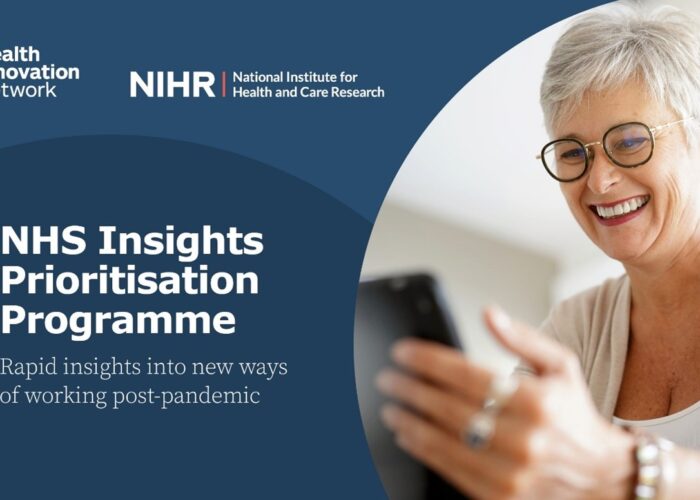 The NHS in North West London has been awarded £200k by Health Data Research UK (HDR-UK) and the Health Foundation to develop and trial digital tools to help prevent complications for people living with type 2 diabetes.
The NHS in North West London has been awarded £200k by Health Data Research UK (HDR-UK) and the Health Foundation to develop and trial digital tools to help prevent complications for people living with type 2 diabetes.
These innovative new tools will be used to pull together data from patient visits to various health professionals including GPs, nurses and A&E. The data gathered will capture information about the health and wellbeing of people with type 2 diabetes, such as their weight, sugar levels and diabetes medication.
The securely managed health information, which will have been consented for use by patients and GP practices, will be used to identify individuals most at risk of developing complications often experienced by people living with type 2 diabetes, this includes heart attack, stroke, blindness, kidney failure and amputations – a cost of £600 million a year to our local NHS.
The hope is that these new digital tools will take steps towards:
- Supporting our clinicians to make better-informed health decisions when treating patients and supporting them to better self-manage their type 2 diabetes
- providing more personalised care by ensuring increased support for people those who are at high risk of complications
- reducing A&E and hospital admissions as a result of preventable complications and
- reducing NHS spend.
Diabetes is one of the greatest challenges currently facing the NHS. In North West London more than 150,000 people have been diagnosed with type 2 diabetes.
Evidence demonstrates that through assessing the risk of complications and providing targeted and early interventions to those at highest risk can reduce mortality, complications, and hospital admissions.
This project is led by the North West London Health and Care Partnership, in collaboration with the Institute of Global Health Innovation, MyWay Digital Health, Health Data Research UK, the Health Foundation, Imperial College Health Partners, Imperial College Healthcare NHS Trust and AstraZeneca, and supported by HDRUK and the Health Foundation.
Doctor Tony Willis, Project Lead, GP and Clinical Director for diabetes for the North West London Health and Care Partnership said:
“We are delighted about winning the HDR-UK and Health Foundation funding because it will allow us to continue innovating and driving forwards our work to improve outcomes for diabetes patients in North West London”.
Amanda Lucas, Programme Director, Discover-NOW, Imperial College Health Partners said:
“We are excited at this new opportunity to demonstrate the value of using real-world data to explore and embed digital solutions for patients with long-term conditions. Building on the fantastic collaboration of Discover-NOW, this project illustrates the potential for using a real world linked longitudinal dataset and how it can be used to revolutionise the way health information is used to treat and prevent disease in the future.”
Caroline Cake, Chief Executive Officer at Health Data Research UK said:
“We are delighted to welcome this project to HDR-UK. It brings significant and demonstrable capabilities in using clinical data to transform the health and care of patients in North West London. The importance of this capability is evident in the context of COVID-19 and supports our mission to unite the UK’s health data to enable discoveries that will improve people’s lives.”
Adam Steventon, Director of Data Analytics at the Health Foundation said:
“We are excited to be partnering with HDR-UK to demonstrate how data and data-driven technologies can be harnessed to improve health and care. Through this work we aim to show how data-driven tools have the potential to improve health and care for everyone.”
Diabetes is just the beginning, if successful this tool could be expanded to help the NHS to treat and improve outcomes for patients with other long term conditions including COPD and heart failure.
Historically health research has predominantly used data to look retrospectively. Through safe and secure gathering of health information we can now look ahead to identify new patterns in illnesses thus helping us to better manage many conditions and, in some cases, prevent them happening in the first place.
For media enquiries email nwlccgs.media@nhs.net.
ENDS
Notes to editors
- This project looks to reduce admissions to hospital and reduce complications for people living with type 2 diabetes in North-West London by using computer-generated prediction tools.
- There are nearly 150,000 people with type 2 diabetes in North West London, accounting for 41 per cent of all hospital admissions, 83 per cent of the spend on treating complications is preventable.
- This project is led by the North West London Health and Care Partnership, in collaboration with the Institute of Global Health Innovation, MyWay Digital Health, Health Data Research UK, the Health Foundation, Imperial College Health Partners, Imperial College Healthcare NHS Trust and AstraZeneca, and supported by HDRUK and the Health Foundation.
- The North West London Health and Care Partnership is made up of over 30 NHS and local authority organisations. Between us, we plan, buy and provide health and care services for more than two million local residents across eight boroughs, spending around £4bn per year. These eight boroughs are: Brent, Harrow, Hillingdon, Westminster, Kensington and Chelsea, Hammersmith and Fulham, Hounslow and Ealing.
- The Institute of Global Health Innovation is one of the six global challenge institutes at Imperial College London and works to support the identification, development and widespread diffusion of healthcare innovation.
- MyWay Digital Health provides transformative diabetes care through low-cost population-based solutions delivering data-driven knowledge and automated self-management advice to patients and health care professionals, which ultimately improves patient care, saves money and lives. Find out more here www.mwdh.co.uk
- The project is funded by Health Data Research-UK and the Health Foundation, and is one of four projects that were successful in winning funding across the UK. Full details about each project can be found on Health Data Research UK’s website at www.hdruk.org
- Health Data Research UK is the national institute for health data science. Its mission is to unite the UK’s health data to enable discoveries that improve people’s lives. It is a not-for-profit public benefit company funded by UK funded by UK Research and Innovation, the Department of Health and Social Care in England and equivalents in Northern Ireland, Wales and Scotland, and leading medical research charities. www.hdruk.org @HDR_UK
- Imperial College Health Partners (ICHP) is the Academic Health Science Network for North West London and lead organisation of HDR UK Discover-NOW Hub: the Health Data Research Hub for Real World Evidence. ICHP innovates and collaborates for a healthier population, solving pressing challenges by collaborating across the health sector and accelerating adoption of innovation amongst member organisations. www.imperialcollegehealthpartners.com
- Imperial College Healthcare NHS Trust is an NHS Trust of 10,000 people, providing care for around a million people every year, in our five hospitals and a growing number of community services in North West London. We have a rich heritage and an ambitious vision for the future of our patients and local communities. www.imperial.nhs.uk
- AstraZeneca is a global pharmaceutical company with a major UK presence. Our purpose is to push the boundaries of science to deliver life-changing medicines. The best way we can help patients is to be science-led and share this passion with the scientific, healthcare and business communities of the UK. https://www.astrazeneca.co.uk/
- The Health Foundation is an independent charity committed to bringing about better health and health care for people in the UK. Our aim is a healthier population, supported by high quality health care www.health.org.uk



